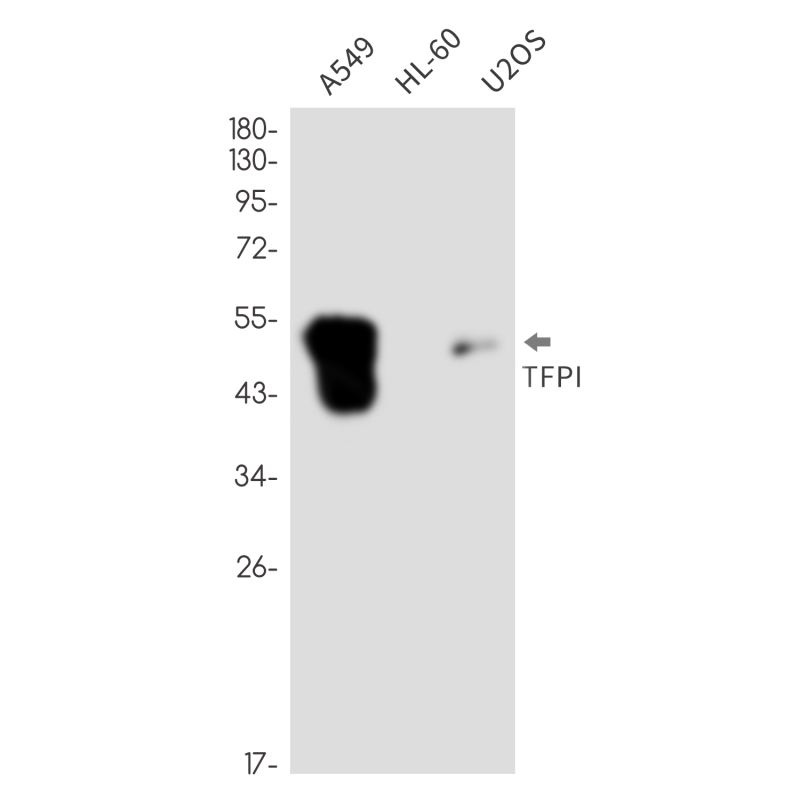
| WB | 1/500-1/1000 | Human,Mouse,Rat |
| IF | 1/20 | Human,Mouse,Rat |
| IHC | 咨询技术 | Human,Mouse,Rat |
| ICC | 技术咨询 | Human,Mouse,Rat |
| FCM | 咨询技术 | Human,Mouse,Rat |
| Elisa | 咨询技术 | Human,Mouse,Rat |
| Aliases | EPI; TFI; LACI; TFPI1 |
| Entrez GeneID | 7035 |
| WB Predicted band size | Calculated MW: 35 kDa; Observed MW: 40-55 kDa |
| Host/Isotype | Rabbit IgG |
| Antibody Type | Primary antibody |
| Storage | Store at 4°C short term. Aliquot and store at -20°C long term. Avoid freeze/thaw cycles. |
| Species Reactivity | Human |
| Immunogen | Recombinant protein of human TFPI |
| Formulation | Purified antibody in TBS with 0.05% sodium azide,0.05%BSA and 50% glycerol. |
+ +
以下是关于Tissue Factor Pathway Inhibitor (TFPI) 抗体的3篇代表性文献概述:
---
1. **标题**:*A monoclonal antibody targeting TFPI inhibits hemorrhage in hemophilia models*
**作者**:Bjørnstad-Otensen, H., et al.
**摘要**:研究报道了一种靶向TFPI的单克隆抗体(如concizumab),通过阻断TFPI的Kunitz结构域功能,增强凝血活性,显著减少血友病模型中的自发性出血事件,为血友病治疗提供了新策略。
2. **标题**:*Structural and functional analysis of TFPI using domain-specific antibodies*
**作者**:Huang, Z.F., et al.
**摘要**:通过开发针对TFPI不同结构域(如Kunitz 1和Kunitz 2)的特异性抗体,揭示了TFPI抑制组织因子-FVIIa复合物和FXa的分子机制,为设计靶向TFPI功能域的抗体药物提供了理论支持。
3. **标题**:*TFPI blockade in a primate thrombosis model enhances thrombus formation*
**作者**:Broze, G.J., Girard, T.J.
**摘要**:在灵长类动物模型中,使用抗TFPI抗体抑制内源性TFPI活性,发现其可加速血栓形成,表明TFPI在维持凝血平衡中的关键作用,并提示抗体干预可能调节病理凝血过程。
---
这些文献涵盖了TFPI抗体的治疗应用(如血友病)、结构功能研究及动物模型验证,反映了抗体在基础研究和临床开发中的潜力。
Tissue Factor Pathway Inhibitor (TFPI) is a key regulator of the extrinsic coagulation pathway, primarily inhibiting the tissue factor (TF)-Factor VIIa complex and Factor Xa. Structurally, TFPI contains three Kunitz-type domains: the first binds TF-FVIIa, the second inhibits Factor Xa, and the third anchors the protein to cell surfaces. Its anticoagulant role makes it a critical focus in thrombosis and hemostasis research.
TFPI antibodies are immunological tools designed to detect, quantify, or modulate TFPI activity. These antibodies, often monoclonal or polyclonal, are utilized in experimental studies to explore TFPI expression patterns, localization in tissues (e.g., endothelial cells, platelets), and interactions within coagulation cascades. They are essential in techniques like Western blotting, immunohistochemistry, and ELISA to assess TFPI levels in physiological or pathological conditions, such as sepsis, atherosclerosis, or cancer-associated thrombosis.
Clinically, TFPI antibodies have therapeutic potential. Inhibitory antibodies targeting TFPI are under investigation to enhance coagulation in hemophilia, bypassing the need for Factor VIII/IX. Conversely, recombinant TFPI or antibody-derived mimetics may treat thrombotic disorders by amplifying anticoagulant effects. Recent drug candidates, like concizumab and marstacimab, leverage anti-TFPI strategies, highlighting its translational relevance.
Overall, TFPI antibodies bridge basic research and clinical innovation, offering insights into coagulation biology and novel therapeutic avenues.
×